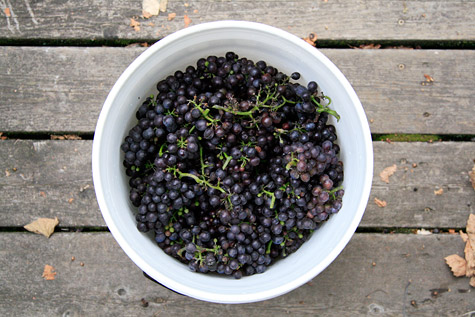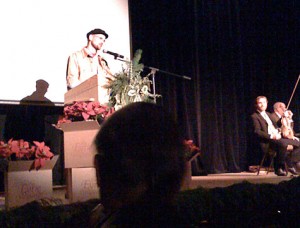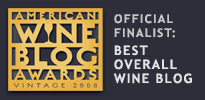Archive for the 'Les Wine and Food' Category
More like Prudy, please
A nice, if not entirely deep profile in Slate of humble viticulturist Prudy Foxx, who relies as much on intuition and experience as science in managing world-class vineyards. Says one of her clients,
She’s just one of those people with great intuition, and in grape growing, that’s so important. It’s so refreshing to walk the vineyards with her. She has all the botanical and scientific knowledge, but it is the intuitive side that is so important to growing anything. It is in her veins.
Amen.
No commentsIt’s the Sporting Life(rs) for me
Check out this medley I shot and cut together for the Sportin’ Lifers, a great new band fronted by our own Whit Draper. Sure, I’m a little biased (though in this case, also correct), but these guys are great, and aside from the pure fun of these songs, here are at least two reasons why. First, these are five gents seasoned with decades of experience as musicians, and it shows: check out in particular Whit’s tinglingly sweeeeet solo in “Kiss of Fire,” about three minutes in, and how Brad Ullrich lovingly coaxes the clarinet in “Come On In,” especially as he takes us back into the vamp around 4:50. Delicious stuff, masterfully laid down.
Second, song selection. I mean, what’s not to like about a band that avoids heavy rotation numbers in favor of “I’ll be Glad When You’re Dead,” “But I Was Cool,” and “Atomic Cocktail” — idiosyncratic songs matching strong grooves with great writing. Cutting together these numbers means I’ve heard them more times than anyone on the planet outside the band, and I’m still humming them happily.
So give them a spin. Seven songs, nine minutes, all good. And tell your favorite club owner.
1 commentAbout this supposedly crappy vintage

I don’t have any skin but grape skins in the game, so it’s been interesting to watch the pitched battle unfolding to define this vintage — before its wines have even finished fermenting, much less transmogrified into something someone could actually taste and evaluate.
On the one hand, there’s everything you’ve been reading in the media, or heard whispered by wine-wags in restaurants, wine shops and tasting rooms: the vintage is a complete wash. Low crop yields, waves of botrytis and powdery mildew, grapes wheezing toward ripeness (if at all), and the coup de grâce, ravenous birds. All have pounded the industry with the most challenging and grim harvest in decades.
On the other hand, you’ve got winemakers who’ve actually been out there, working the vines and the fruit. The ones I’ve talked to are stoic, but guardedly optimistic, arguing that the cooler weather has produced beautiful, elegant wines that truly express the uniqueness of Oregon – for the first time in years.
Keep in mind, of course, that their livelihood is utterly dependent on consumers’ preconceptions about a vintage. If a consensus develops that a vintage is great, it’ll fly off the shelves; but if the buzz is otherwise — or worse, that it’s a disaster — they’ll have trouble even moving it out of the bottling room. Would you fan the flames of the latter if your income depended on it? I didn’t think so.
So who’s right?
I think one answer may lie in the bucket you see above. That’s the sum total of the Giraud “estate” harvest from my back yard, about 25 pounds. Before the rains bore down a week or so ago, I frantically clipped what fruit I could salvage: probably half unripe and mildewed, half passable, and all told, 20 brix. Without some sugar, that would produce wine a shade above 11% alcohol, fine for Riesling but anemic for Pinot Noir.
So there you go: proof. The buzz is right, the vintage sucks.
But not so fast. I’m a rank, drooling amateur when it comes to farming grapes. Most years I’m lucky even to get a good crop of mildew, much less viable, fermentable fruit. That I got vaguely healthy grapes as high as 20 brix this year is nothing short of a miracle, in fact.
So if a yahoo with a hoe can do that, what do you think someone with years of training and experience can do? Take, for example, the fruit we brought in from Oracle Vineyard in the Dundee Hills, farmed by people who actually know what they’re doing. Totally clean, exceptional flavor, vivid acidity. Its numbers look great, and well within the ballpark of ideal for Pinot Noir.
I’ve heard a lot of that around the Valley. Sure, some horror stories, and certainly low yields, a tsunami that will roll dire economic consequences toward the shores of those without deep enough pockets. But at the same time, tales of great flavors and a chance to make a truly Oregon Pinot Noir, one balanced on the razor’s edge of ripeness where the varietal truly comes alive.
So that’s my read. In the hands of people who know what they’re doing — and didn’t panic — this vintage is going to produce some disarmingly elegant wines. Will Robert Parker anoint them with high scores? Unlikely. It’ll be nowhere near the syrah-like California style he favors. But will it earn high marks from those smart enough to snap up the tragically few that make it to market? Oh, yeah.
In the end, maybe what’s scariest about this vintage is that it’s kind of a ticking time bomb for less talented winemakers and growers. Everyone’s reputation will probably survive the year, but when 2010 wines hit the shelves, there will be nowhere to hide: the true measure of talent will be unflatteringly revealed in the glass.
9 commentsWe’re (literally) in the MIX!
Landing on some doorsteps a couple weeks ago, and on newsstands even as we speak, the latest issue of the Oregonian’s MIX Magazine has a nice feature on us you should check out. (The site is still featuring the September issue, however.)
The basement of Matt Giraud’s Southeast Portland bungalow looks an awful lot like a mad scientist’s laboratory. There are chemistry tools, beakers and small scales on a well worn workbench, and every nook is filled with imposing equipment.
But oak barrels, a wine press and a 124-gallon steel fermentation tank reveal that this isn’t a space for DNA sequencing. This is where Giraud and a collective known as Les Garagistes gather every fall to make small batches of wine for their own enjoyment…
Hmmm, DNA sequencing… kind of a good idea, actually. Why drink seven wines when you can drink just one? Prepare to tremble before our mighty Caber-lot Syrpino-vedre, you puny, normally-sequenced humans!
Okay, then. As I was saying, in order to run the story during harvest, MIX’s Beth Nakamura shot the photography for it a year ago (now that’s planning ahead!), when we were bottling and James concocted a magnificent poached egg and meurette dish. So if you check it out and find yourself thinking, “man, those hairstyles are sooooo 2009″ — well, that’s why.
Thanks much to Grant Butler for the great write-up, and for stopping by for a tour (sadly, it doesn’t take long…) and a conversation about all things Garagiste. I think he liked our Oracle Pinot Gris — though that assumes his eyes bulge out and he grips his throat whenever he really likes a wine…
Find out where you can get a copy here — and then save the hassle next time by subscribing!
No commentsDuck and Cellar
[ Apropos the dawn of a new decade in a couple days, a wine column I wrote about the anxiety surrounding the dawning of the last one — the infamous Y2K — and how savvy wine hoarders (er, collectors) might make the most of it. ]
It’s the beginning of a new year, but instead of optimism, there’s an undercurrent of unease about what life will be like 345 days from now. Forgetting the religious nuts and their threats of apocalypse, it’s geeks and the specter of core, computer-based systems taking a dive that really has people freaked out. Will there be water, gas, phone service? Authorities assure us there will, but the eerie thing is that no one really knows for sure. We certainly don’t. We’ve already heard reports of people starting to hoard food, so we say play it safe: start hoarding wine. In other words, start a cellar.
Indeed, when the infrastructure of American civilization grinds to a halt, it’s critical we remember that it won’t just be difficult to get food, it will be impossible to get wine. If you’ve thought ahead, you’ll be sitting pretty, with ample stores to wash down the leaves, berries, or grubs you’ve collected for a meal. In fact, your cellar will be a gold mine to barter for all manner of goods and services as unprepared wine lovers scrabble about, fermenting their socks and bits of string. Think of what could be yours for a simple bottle of French Côtes-du-Rhône: a mere $9 while money still works, it may be worth a chauffeur-driven, Flintstone-like car in the new millennium.
But as before the revelation of the Y2K bug, it will be important to follow a few simple rules to safeguard your investment. Read more
No commentsA showcase of festive fermentations
Here’s a truly Portland-y thing to put on your calendar: Les Garagistes has been accepted into the Portland Fermentation Festival, which bubbles up this Thursday, August 27th:
-
6-8 pm
Ecotrust’s Billy Frank Jr. Conference Center
721 NW 9th Ave. Portland, OR
Free!
As you can see from the site, the Ferment Fest isn’t only about wine: it’s about all things that ferment or are fermented in general, like bread, cheese, mead, cider, sauerkraut, kimchi, vinegar, yogurt, and more. In fact, I wasn’t sure whether wine was really something they wanted to sully their fine event, so I asked if our lowly beverage might play a part. To my surprise, they said yes, in part because we ferment with wild yeast.
So James and l will be there pouring our best in tiny little cups. Come by for a shot and say hello.
No commentsRemembering David Lett
 Last night, my wife and I were lucky to be two of more than 700 people packed the McMinnville Community Center to honor David Lett, the Oregon wine pioneer who died in early October on the verge of what would have been his 38th Oregon wine harvest. (As with all things in the winemaking world, everything gets put on hold until the wines are safely in barrel. Thus the two month delay in scheduling the event — even David would have skipped his memorial if it had happened during harvest.)
Last night, my wife and I were lucky to be two of more than 700 people packed the McMinnville Community Center to honor David Lett, the Oregon wine pioneer who died in early October on the verge of what would have been his 38th Oregon wine harvest. (As with all things in the winemaking world, everything gets put on hold until the wines are safely in barrel. Thus the two month delay in scheduling the event — even David would have skipped his memorial if it had happened during harvest.)
A number of speakers remembered the man, including former Governor Barbara Roberts, winemaker David Adelsheim, and restauranteur Nick Peirano, the latter nearly choking up a number of times as he recalled his old friend. But most touching was his son Jason (pictured above), who led the crowd in a toast asking us to shout “‘Cheers’ loud enough for [his] father to hear in whatever vineyard he’s now tending.” Oh yes, I think he heard. So many lives have been touched by Lett, his irascibility, his generosity, his tenaciousness and his charm, it was — well, inspirational, I can’t think of a better word — to feel so many people bound to one another through him. In fact, probably half the people in the room would be grinding it out in different careers right now were it not for his 1965 “theory” that Pinot Noir would flourish in the soggy hills of northern Oregon.
In 2001, I was lucky enough to spend some time with him when I was completing Life in Vine, and I have about 45 minutes of an interview I did as we walked through his historic vineyard. I’m starting to cut together something out of it, but last night, as images from his life floated by on an overhead screen, I remembered one exchange in particular (embedded at right) that summed up so much about him for me.
As I begin to ask what possessed him to plant Pinot Noir, watch that grin spread across his face: He’s heard that question a thousand times before, and you can tell he’s got a witty, well-practiced response in his pocket, ready to go whenever I stop talking and let him unload it. But something happens in the course of delivering the line: its essential truth overtakes him. For Lett, Pinot Noir truly was a princess, and with all his soul, every fall for nearly four decades, he vied for her hand, more than once even winning it.
If that doesn’t make him a prince, to say nothing of a king, then I don’t know what would. Cheers, David.
2 comments